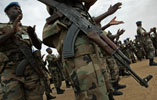
We’re beginning to sound like a broken record… As we noted yesterday, a story in the Sudanese press about the confusion over Special Envoy Gration’s intentions highlights the urgent need for a consistent and firm line from the Obama administration. Now, amid reports that two leaders of UNAMID, the joint U.N.-African Union peacekeeping force for Darfur are leaving their posts, it need for leadership and direction on peacemaking and peacekeeping is more apparent than ever.
First, AllAfrica.com reported yesterday on the farewell ceremony for UNAMID force commander General Martin Luther Agwai, who has served in Darfur since 2007 when he was deployed as force commander for the African Union Mission in Sudan.
Then Reuters broke the news that the head of UNAMID has resigned and will vacate his post on August 31. While Special Representative Rodolphe Adada was often criticized by those who said he was an ineffective leader, U.N. Secretary General Ban Ki-moon praised Adada for his service during an “initial deployment phase and in an environment of unprecedented difficulty.”
But no matter what people say about their performance on the job (and there certainly have been critics), the glaring hole in the equation is that there isn’t a peace agreement in Darfur for UNAMID enforce. In the meantime, the peacekeepers have been given the task of overseeing an expanse the size of France with a force just 13,500-strong – 60 percent of its authorized strength. Of course this was a recipe for disaster.
The departure of these two leaders will undoubtedly create another challenge for UNAMID to overcome, as a change of leadership in any bureaucratic institution often does – multiplied by two in this case. But a quote by our own John Prendergast’s in the Reuters article sums up the unfortunate larger truth:
"There is an urgent need to construct a more credible and effective peace process backed by stronger leverage. U.N. efforts have meandered without laying down a serious peace proposal. In the absence of diplomatic leadership, it is not surprising that most analysts view UNAMID as ineffective."

